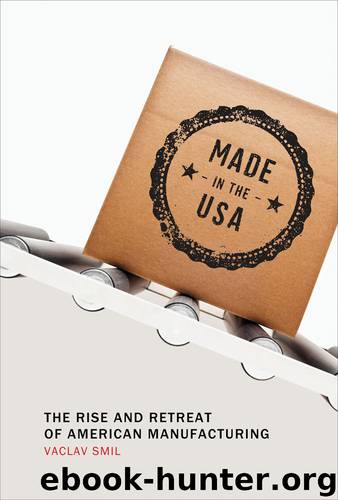Made in the USA by Vaclav Smil

Author:Vaclav Smil [Smil, Vaclav]
Language: eng
Format: epub
Publisher: The MIT Press
Published: 2013-03-25T16:00:00+00:00
This new wealth rapidly spilled into excessive consumption, and two items became icons of this excess. In 1992, American Motors General began retailing a civilian version of a high-mobility, multipurpose wheeled vehicle (HMMWV). GM bought the brand in 1998 and eventually produced three models of the Hummer, a vehicle its website called “like nothing else”—as indeed it was, with a mass up to 3 t and an extravagant fuel consumption (fuel waste would be a better term) of 6 mpg. The second icon of excess was the McMansion, which can be characterized as a sprawling, ostentatious, yet rather shoddily built house with so many rooms that some remained unvisited for months and with at least three garages, an outdoor pool, indoor Jacuzzis, and a dubiously furnished great room with a cathedral ceiling.
Amid this e-boom and excess consumption, US manufacturing seemed to be doing well: its total value added to the country’s GDP rose (in real terms) by 46% between 1990 and 2000, and overall employment in the sector not only held but actually rose slightly, by about 3%. But underneath this veneer of good news the trends that had begun weakening the foundations of the country’s economy during the 1970s and 1980s were only accelerating. In 1996 crude oil imports supplied for the first time more than half the total demand. A significant decline in the trade deficit that began in 1988 lasted only until 1992, after which the rise resumed, and new records were reached in rapid succession: in 1999 the country still had a (diminishing) surplus in service trade, but its deficit in trading goods had surpassed $330 billion, for an overall net outflow of nearly $265 billion.
By the year 2000 the country’s net international investment position had fallen to a deficit larger than $1 trillion, and it continued to slide, surpassing $2.7 trillion in deficit by the end of 2009. A new energy dependence record was reached in 2001 as US imports of crude oil and refined petroleum products rose to 60% of the total consumption—and then grew to 66% just four years later. The terrorists who attacked on September 11, 2001, succeeded in damaging the US economy: the direct losses were a small fraction of the enormous sums that the United States began to spend on massive new bureaucracies (the Department of Homeland Security), on much expanded information gathering, and on waging wars in Afghanistan and Iraq that, in the absence of any new taxation—indeed, at a time of large tax cuts—had to be funded by increased borrowing.
And then the country was hit by the global economic crisis of 2008–2009, the worst downturn of the entire post–World War II era. The effects of the crisis were fought by the US government with huge bailouts of financial institutions and auto companies and with federal spending aimed at stimulating the economy. The federal budget deficit began to multiply. After four years of budget surpluses (1998–2001), the deficit rose to nearly $320 billion in 2005, then quadrupled to $1.
Download
This site does not store any files on its server. We only index and link to content provided by other sites. Please contact the content providers to delete copyright contents if any and email us, we'll remove relevant links or contents immediately.
Life 3.0: Being Human in the Age of Artificial Intelligence by Tegmark Max(5558)
The Sports Rules Book by Human Kinetics(4386)
The Age of Surveillance Capitalism by Shoshana Zuboff(4292)
ACT Math For Dummies by Zegarelli Mark(4048)
Unlabel: Selling You Without Selling Out by Marc Ecko(3662)
Blood, Sweat, and Pixels by Jason Schreier(3624)
Hidden Persuasion: 33 psychological influence techniques in advertising by Marc Andrews & Matthijs van Leeuwen & Rick van Baaren(3565)
The Pixar Touch by David A. Price(3438)
Bad Pharma by Ben Goldacre(3427)
Urban Outlaw by Magnus Walker(3395)
Project Animal Farm: An Accidental Journey into the Secret World of Farming and the Truth About Our Food by Sonia Faruqi(3221)
Kitchen confidential by Anthony Bourdain(3089)
Brotopia by Emily Chang(3054)
Slugfest by Reed Tucker(3002)
The Content Trap by Bharat Anand(2924)
The Airbnb Story by Leigh Gallagher(2854)
Coffee for One by KJ Fallon(2636)
Smuggler's Cove: Exotic Cocktails, Rum, and the Cult of Tiki by Martin Cate & Rebecca Cate(2540)
Beer is proof God loves us by Charles W. Bamforth(2461)
